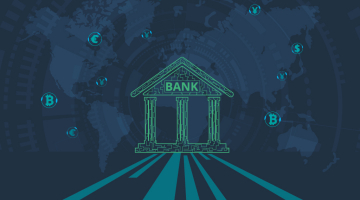

AI in banking: Use cases and benefits
Gradually but indeed becoming actively applied across industries, Artificial Intelligence (AI) technology is rapidly gaining momentum in finance. AI in banking opens the horizons of sophisticated solutions that deliver the next level of ROI. Experts predict that the smart tech concept will save the banking industry up to $1 trillion by 2030.
Strategic AI implementation in banking can deliver significant benefits. At DICEUS, we have a lot of experience in this field, so we decided to share our take on how AI tools prevail in the modern world of financial services.
Check out our AI expertise.
AI in banking: The history of development and the current state
Although AI has become quite trendy now, it has been around in one form or another for quite some time. The term was originally introduced in 1956 during the Dartmouth Summer Research Project on Artificial Intelligence (DSRPAI) sponsored by John McCarthy and Marvin Minsky.
After World War II, the global paperwork turnover grew dramatically, which required automation systems. In the 1960s, research focused on Bayesian statistics and was widely used in machine learning. In the mid-1970s, the “winter of artificial intelligence” began when government funding and interest in the field subsided.
The AI hype resumed in 1983 when the British government’s Alvi research project was funded by the military to compete with Japan’s Fifth Generation project. In the 1980s, more than two-thirds of Fortune 1000 companies developed at least one AI project.
In 1982, AI made its mark in the financial services industry when James Simons founded Renaissance Technologies, a quantitative hedge fund. As of April 2021, its market capitalization reached $165 billion.
Today, artificial intelligence in banking as a separate case study is used to efficiently identify fraud and suspicious transactions, achieve higher personalization, as well as boost customer credit assessments, cybersecurity, and overall risk management.
According to an OpenText survey, 80% of banks are aware of the potential benefits of AI, and 75% of the largest establishments are implementing projects based on it.
Banks are using AI to transform customer experiences, delivering uninterrupted 24×7 service. The back and middle offices of the investment industry and other financial services also benefit from the technology.
Benefits of AI in the banking industry

AI makes financial institutions more efficient and trustworthy. On the flip side of things, this boosts the competitive edge of establishments. The growing influence of AI in the banking sector minimizes operational costs, improves customer support, and improves process automation. On top of that, the use of AI in banking helps users pick loans at an attractive interest rate.
Fraud detection and compliance
Compliance with industry regulations is a top priority for banks. AI allows you to automatically update processes and work in accordance with existing regulatory requirements.
It can also help minimize errors in reports by automating due diligence to keep accurate customer records at all times. In addition, AI can analyze large amounts of data and identify suspicious transactions, even the smallest ones.
Assessment of investments
The process involves collaboration between multiple teams responsible for various aspects of investment asset management, credit analysts, portfolio managers, and product specialists.
An AI-powered application can process large amounts of data from multiple sources in real time, learning each analyst’s preference and risk tolerance across a timeline. In other words, the algorithm will determine which options are based on fundamental and technical data rather than human factors.
Costs reduction
AI in the banking sector can improve the efficiency and productivity of individual employees. Decision Management Systems (DMS) enable you to make smarter decisions faster. In addition, the DMS helps speed up client connections by using predefined answers to common questions. Thanks to this technology, the company can make do with a smaller staff.
Human error often results in dire financial consequences. DMS eliminates this risk by providing accurate and consistent data entry into the system. Plus, AI reduces labor costs by streamlining capital investment decisions and forecasting.
Credit scoring and KYC
A comprehensive assessment is required before opening an account. The required documentation depends on the customer profile. Credit appraisal can be a time-consuming process if there is not enough information about the client and their creditworthiness.
AI helps solve this issue by performing automated checks on internal databases and external data sources such as central banks, national statistical agencies, public property registers, company registers, and social media. This reduces the risks associated with non-compliance with KYC.
Client service
AI in the banking industry improves the quality of services through accurate and fast personalization (using, e.g., intelligent chatbots). Conversational interfaces automate repetitive tasks so people can focus on more complex problems. Another great aspect is that chatbots can use machine learning algorithms based on customer interaction. This allows you to increase sales and customer retention because they tend to buy products that they know about.
Just look what we do for banks.
AI use cases in banking
AI will help drive savings in three structural segments:
- Front office (conversational banking)
- Middle office (fraud detection and risk management)
- Back office (underwriting)
The most significant applications of AI and machine learning are in frontal and mid-sized offices. Now let’s take a look at some AI in banking examples.
Advanced analytics
Banking institutions register millions of transactions every day. The amount of information generated is enormous, so collecting and registering it, as well as determining the relationship between the collected data, becomes a difficult task.
Previously, a bank employee used to know the name and financial history of their client and understood which options are best to offer. Now, this is unrealistic, since the banks have more clients, including those abroad.
AI applications collect and analyze data. This improves the user experience. The information can be used to issue loans or detect fraud. AI helps you evaluate potential profit using big data analytics.
Customer experience
AI-powered banking applications display services, offers, and information based on user search patterns. They can track user behavior and provide personalized suggestions based on that knowledge. This ultimately boosts convenience for users (clients) and is long-term beneficial for the bank.
Cloud services
The cloud is becoming a catalyst for corporate business transformation, changing the rules of the game for financial services providers. Cloud computing is coming to the fore as a priority for senior executives and board members.
Banking and capital market leaders are increasingly realizing that the cloud is more than technology. This is the place where financial services companies can store data and access advanced software applications online.
Leading cloud providers offer innovative products-as-a-services that help drive business and operating models to increase revenue, boost customer understanding, contain costs, and deliver relevant products faster.
The cloud can also help monetize corporate data. It offers tremendous opportunities for enterprise synchronization, breaking down the silos of operations and data for risk, finance, regulations, customer support, and more. Consolidating datasets in one place enables advanced analytics for integrated analysis. Companies can work entirely in the cloud or partially with an on-premises system.
Robotic process automation (RPA) and image recognition
AI and Robotic Process Automation (RPA) are two successful technologies that can improve customer satisfaction and employee morale while lowering operating costs.
End-to-end automation is the key to the self-service needed by a large number of customers. With RPA and AI, it is possible to fully automate the opening of a new bank account on the Internet. Before opening an account, the online chatbot checks the type of account that the client requires and provides them with a link to the corresponding form.
The completed form is submitted and passed on to another robot, which starts creating a new account. The robot performs internal tasks such as checking your credit score and running a know-your-customer check on Google and social media. It validates uploaded documents using text analytics and natural language processing to interpret and classify cue points from free text.
The robot verifies that the client’s name on the form and the driver’s license match and performs the operations necessary to create a new business account, interacting with the various server systems of the bank. The final decision is made by a person. Based on human input, the robot learns to respond to situations like this.
If the customer’s details meet the bank’s requirements, the robot automatically sends an email with a welcome message, account information, and credentials. Finally, the robot reports to the robot control room that the mission has been completed.
Natural language processing (NLP)
NLP enables an intelligent system (robot) to work according to your instructions based on dialogue. This involves building computers to perform tasks in the languages used by humans. Communication within the system is carried out using oral speech (voice input) or written text input.
Banks use AI algorithms in the frontend to simplify customer identification and authentication, simulate live employees with chatbots and voice assistants, deepen customer relationships, and provide personalized insights and recommendations.
AI is also deployed by banks as part of their middle office functions for risk assessment, fraud detection and prevention, anti-money laundering (AML), and know-your-customer (KYC) regulatory audits.
Banks recognize the need for a holistic AI strategy that extends across all business lines, usable data, relationships with partners and employees.
Intrested in AI development for banking. Check our offer here!
DICEUS service offering for banks
We offer a full scope of the capabilities of AI in banking use cases, including the development of performance management systems, a full range of analytics, advanced forecasting tools, and software platforms. Our software solutions enable financial providers to do the following:
- Provide better services, attract more customers, and increase revenue. We help optimize data aggregation and use, reduce regulatory and market risks, and successfully combat fraud.
- Leverage AI to build an intelligent customer relationship management (CRM) system with predictive capabilities based on historical data. Our team will help you determine how AI can benefit your bank.
- Empower AI, develop banking products and services faster and more efficiently through the use of the cloud. Our team will develop the right AI implementation and deployment strategy for your financial institution.
- Leverage OCR solutions to help your bank acquire and analyze digital visuals faster. Computer vision software will greatly simplify the work of staff and provide more reliable data analysis.
- Apply NLP solutions. Our team has experience in creating customized chatbots for banks and financial institutions. We conduct an in-depth analysis of the target audience to determine the optimal communication models and contexts.
On top of all that, DICEUS provides software development services for building a full-featured online banking system from scratch. If you need to modernize your existing web banking, we will do it at the highest quality!
We offer proprietary mobile banking solutions with many features, including management of accounts, payments, money transfers notifications global positioning (GPS).
We provide RPA integration. Our experience includes solutions for risk management, compliance, AML, fraud checks, customer support. Our teams are experienced in DWH architecture, ETL processes, aggregation, data migration, database maintenance, and retirement of legacy applications.
We help streamline processes and achieve high profitability by leveraging the technological power of our financial software. We modernize legacy systems, eliminate technical delays and solve data management problems.
Our banking software development and industry expertise cover major banking systems, data warehouses, robotic process automation, cloud computing, and more.
At DICEUS, we kick off and complete projects, adhering to the best practices of business analysis by collecting both functional and non-functional requirements, and system integration, consisting of the following steps: obtaining, cleaning, structuring data, writing, implementing an algorithm, training, and improving the model.
The application of artificial intelligence in banking has its own characteristics. The choice of services, such as computer vision, depends on the specific tasks and data used. Thus, their cost and quality depend on your needs. We are ready to create a unique AI algorithm for your bank. By cooperating with our team, you’ll be able to do the following:
- Manage your project with metrics
- Choose a suitable interaction model
- Get a guarantee of timely delivery of software
- Benefit from a strict quality assurance system
We have an extensive pool of seasoned talents waiting to take on your project. Ready to make the first step?





